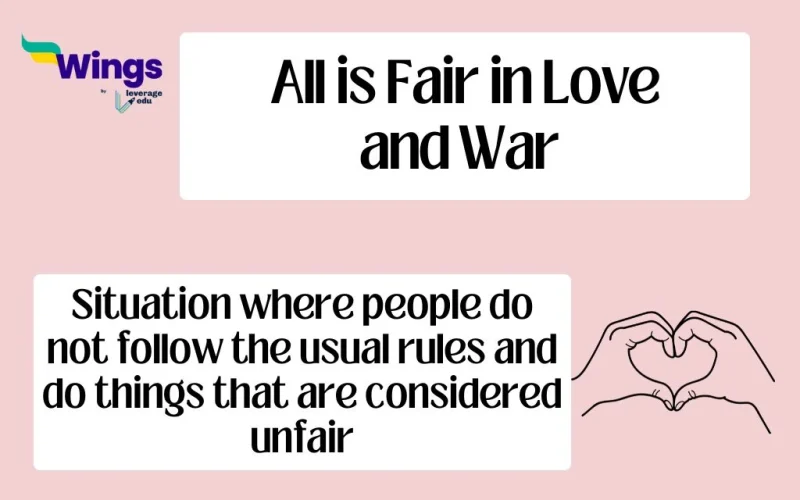The ” All is Fair in Love and War” idiom is used to indicate an instance in which individuals act in a way that is inconsistent with accepted norms and is generally regarded as unfair. People are not constrained by the laws of fair play when love or war is at stake.
The expression “all is fair in love and war” can be traced back to John Lyly’s 1578 novel “Euphues: The Anatomy of Wit.” The story follows the love exploits of a successful and alluring young guy. There is a quotation in it that reads, “The rules of fair play do not apply in love and war.” Let’s dig in deeper to know more about the idiom.
This Blog Includes:
Meaning of All is Fair in Love and War Idiom
The idiom “All is fair in love and war” means that in intensely competitive situations, like romantic pursuits or conflicts, people may abandon normal ethical considerations and use any tactic to win. It describes this behaviour but doesn’t necessarily justify it.
It highlights the lengths people might go to when highly motivated, but it’s crucial to remember that ethical boundaries still exist, and consequences can be severe. The idiom is often used with irony, acknowledging questionable behaviour without necessarily promoting it.
Also Read: Break the Ice- Idiom
All is Fair in Love and War Synonyms
A few synonyms of this idiom are:
- Any conduct is okay in certain circumstances
- Rules of hard play are acceptable in war
- The end justifies the means
- Unethical behaviour is allowed in some situations
- Unfair behaviour is allowed in some situations
All is Fair in Love and War: Example Sentences
Here are some example sentences using the idiom “All is fair in love and war”:
- She knew it was a bit underhanded, but all is fair in love and war, and she was determined to win his heart.
- He spreads rumours about his rival, believing that all is fair in love and war when it comes to winning the competition.
- While I understand the sentiment that all is fair in love and war, I still think honesty and respect should be priorities.
- When it comes to dating, it seems all is fair in love and war; people will do almost anything to get a date.
- She used her friend’s secret information to sabotage her chances with the guy she liked, thinking all is fair in love and war.
Quick Read: Idioms for Love to Express Your Feelings
All is Fair in Love and War Idiom: Quiz
Instructions: Choose the best answer for each question. We have also provided answers to all the questions at the end to check your performance.
1. What does the idiom “All is fair in love and war” mean?
a) Love and war are always just and ethical.
b) In situations of intense competition or conflict, people may use tactics they wouldn’t normally consider acceptable.
c) Love and war are similar in their peaceful nature.
2. The idiom suggests that in love and war, people might:
a) Always act with honesty and integrity.
b) Bend the rules or use unconventional methods to achieve their goals.
c) Always prioritise the well-being of others.
3. Is the idiom advocating for unethical behaviour?
a) Yes, it encourages people to be ruthless.
b) No, it simply acknowledges that desperate situations can lead to desperate measures.
c) It depends on the specific situation and cultural context.
4. Which of the following scenarios best illustrates the idiom?
a) Two friends decide to have a fair and open competition for a job.
b) A person uses misleading information to win the affection of someone they like.
c) Two countries sign a peace treaty after a long war.
5. What is a potential negative consequence of acting as if “all is fair in love and war”?
a) It can lead to stronger, more resilient relationships.
b) It can damage trust and create long-lasting resentment.
c) It always guarantees success in achieving one’s goals.
Answer Key:
- b) In situations of intense competition or conflict, people may use tactics they wouldn’t normally consider acceptable.
- b) Bend the rules or use unconventional methods to achieve their goals.
- c) It depends on the specific situation and cultural context. (While the idiom describes this behaviour, it doesn’t necessarily endorse it.)
- b) A person uses misleading information to win the affection of someone they like.
- b) It can damage trust and create long-lasting resentment.
FAQs
This idiom suggests that in situations of intense competition, like romantic pursuits or armed conflict, people might use tactics they wouldn’t normally consider ethical or acceptable. It implies that the usual rules of conduct might be suspended when the stakes are high.
Not quite. Even in love and war, there are often lines that shouldn’t be crossed. The idiom highlights the temptation to bend the rules, but it doesn’t mean that all actions are automatically justifiable. There are still ethical considerations, even if they become more complex.
The exact origin is uncertain, but the underlying idea is very old. Similar expressions exist in various languages, suggesting a long-held understanding that competition for resources can lead people to behave in unusual ways.
Understanding the idiom can help you be more aware of the dynamics at play in competitive situations. It can prompt you to consider the motivations of others and to anticipate that they might not always play by the “rules” you expect.
Check out more blogs on Idioms
This was all about “All is Fair in Love and War.” You can also follow the Learn English page of Leverage Edu for more exciting and informative blogs related to English grammar and the English language.


 One app for all your study abroad needs
One app for all your study abroad needs












 60,000+ students trusted us with their dreams. Take the first step today!
60,000+ students trusted us with their dreams. Take the first step today!